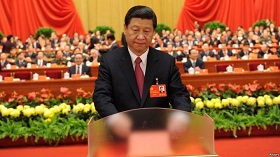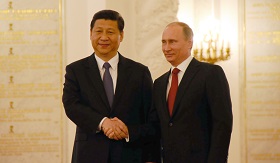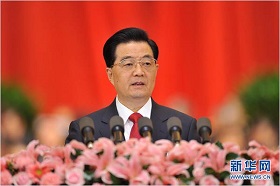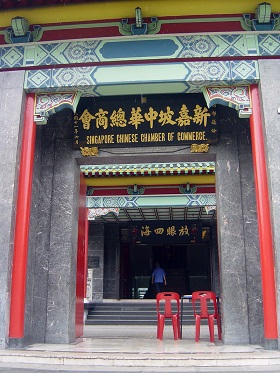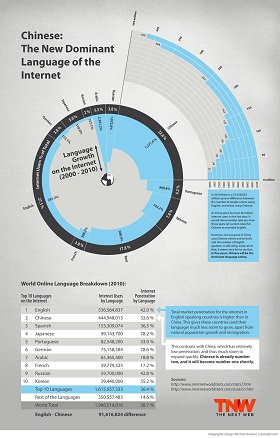The political lexicon of the fifth generation of Chinese leaders in power has been increasingly urging the nation to turn the ‘Chinese Dream’ into a reality - “the great revival of the Chinese nation” [1]. Recently there have been several heated debates, both in China and elsewhere, about what this dream is really about. The pride of the Chinese nation and one of the pillars of the “great rejuvenation of the nation” is certainly Chinese culture in its broadest sense, complete with the history and knowledge base of modern China, and the Chinese language, all of which have long been used as conduits of China’s soft power.
The Chinese Language as a Resource of Soft Power - Today and Tomorrow
Since the early 2000s, there has been a rapid rise in the number of people who are studying Chinese as a foreign language. According to the Office of Chinese Language Council International (popularly Hanban), set up in 1984 by the Chinese Government, there are over 40 million current students. It is very fashionable now to study the language and culture of the Celestial Empire, and some countries have been hit by a ‘Chinese language fever’.
A whole set of factors is driving this phenomenon both in China itself and abroad. Thirty years of “reforms and openness”, together with the foreign economic policy of “going outside” have culminated in sustainable economic growth and rapid development in China. As the country has become more and more powerful and influential in the world, learning Chinese for many has become an important factor for a successful career, a better job or access to a larger sales market. Learning and teaching Chinese are particularly important in countries that have been strengthening their trade and economic partnership and long-term cooperation with China. In East and Southeast Asia, some export and import companies list proficiency in Chinese among the qualification criteria for job seekers [2].
No less important to the promotion of language and culture abroad are active policies by the Chinese leadership to sponsor a network of Confucius Institutes and a variety of cultural and research centres.
The global network of Confucius Institutes covers many countries across the world, including Russia. The Office of Chinese Language Council International promotes Chinese abroad and has opened over 350 Confucius Institutes and Classes in 113 countries. The very first Confucius Institute came about in 2004 in Seoul, South Korea. Confucius Institutes and Classes are non-profit institutions whose mission is to teach Chinese and promote Chinese culture. In addition, the institute’s function is to help organize academic conferences, popularize the language and culture through various events and competitions about China, hold qualifications tests in Chinese (HSK), prepare and publish Chinese textbooks; sponsor student and faculty training in China, and advise on education opportunities in the Chinese Republic.
The Office has plans to bring the number of Confucius Institutes to 1000 by 2020. In Russia, there are over 20 Confucius Institutes and Classes, located in Moscow, St. Petersburg, Vladivostok, Kazan, Novosibirsk, Yekaterinburg and some other cities. The number of undergraduates in Russia that study Chinese exceeds 25,000.
Another mission is to offer grants to foreign undergraduates to come to study in China. According to the Commission on State Training at the Ministry of Education (established in the 1980s), in 2010 the Chinese government allocated Yuan 650 million (about USD 80 mln) for that purpose alone. Of note is also the Taiwan-based Chiang Ching-Kuo Foundation for International Scholarly Exchange, which is named after a former Taiwan president and exists to fund projects and offer grants to foreign-based sinologists, including those in Russia and East European countries.
A special mention should be made about the Research Centre for Foreign-based Sinology, which was opened in 1996 at the Beijing Foreign Languages University in order to promote academic sinology in China and abroad and to finance a number of academic foreign fellowship programmes, including for scholars from Russia. The centre has compiled and published the following resources, among others: The Early History of Teaching Chinese in Russia; Concise History of the Orthodox Christianity in China; History of Sinology in Russia; Russian Christian Mission at Beijing, etc.
As the Chinese leader has stressed, comprehensive study of the history and culture, and teaching and learning the Chinese languages can open opportunities for communication between countries, breed interest in China, and teach understanding and respect for customs and traditions of the Chinese people. It is no secret that in everyday life our common notions about one another remain wary and obsolete. In the 1990s, the Russians and Chinese got to know each other mostly through trans-border trade, which did not require substantial cultural awareness. Both Russia and China have a wealth of history and culture, and they have something to offer apart from goods with the ‘Made in China’ label or raw materials. Hence the main policy mission is to build a brighter and more positive image of the country (true for both China and Russia).
Many new Chinese culture centres (CCCs) have been opened in the world since the 17th party congress in China (in 2007). There were 9 of them by the late 2011, in Egypt, France (Paris), South Korea, Germany (Berlin), Japan (Tokyo), Mongolia and other countries. In 2012, CCCs opened up in Bangkok, Moscow and Madrid. In 2013, similar centres are to be set up in Singapore, Pakistan, Sri Lanka, Serbia, Mexico, and Canada. Intergovernmental agreements have been planned to open similar centres in Turkey, Romania, Hungary, Italy, India and Great Britain. Between 2007 and 2011, CCCs offered classes to more than 26,000 people and conducted over 2,500 events.
The ‘Plan for CCCs Development Abroad” is part of the 12th five-year plan of socioeconomic development of China for 2011–2015.
The very first CCC in Russia was opened in downtown Moscow in December 2012. With an area of almost 3,026 sq. m, the centre has exhibition halls, digital and multifunctional rooms, lecture rooms and a library. The centre sponsors film shows, invite famous scholars and artists, offer courses of the Chinese language, sessions of Wu-Shu, lessons in calligraphy, Chinese art and cooking.
Its work gives a new impetus to Russian-Chinese relations and helps promote knowledge of the two countries on a new and important level. With the growing potential of the two countries and stronger relations of strategic partnership and cooperation, building unbiased and balanced perceptions shared by the popular masses in the two countries is a very important and largely unfulfilled objective.
Chinese vs. English?
Chinese is one of the official languages at the United Nations and Shanghai Cooperation Organisation, spoken in mainland China, in Taiwan, Singapore and by numerous Chinese diasporas across the world. Chinese is taught at secondary schools in Malaysia and Singapore. Significantly, in South-East Asia, ethnic Chinese are in leading positions in national economies, controlling huge financial flows. They have associations of foreign-based Chinese and the Chinese diaspora; they open kindergartens and schools with Chinese as a foreign language, universities and mass media in Chinese.
Free state-sponsored programmes for students of the Chinese language (“closer to native roots” short-term courses) in mainland China and in Taiwan are quite popular among foreign Chinese diasporas who send their children and grandchildren to their historical native land to study the language, history and culture. These programmes could be quite important for Russia as offering valuable experience in the ways of implementing a policy aimed at engaging qualified professionals, who have left the country, in the modernization of the country.
In Southeast Asia today, Chinese is aggressively competing with English. For several years now, China’s Chamber of Trade and Industry in Singapore has been offering courses in business Chinese, and since 2009 the government of Singapore has been supporting students of Chinese. For many professionals working at major companies, English is no longer a life-changing choice, since many of their clients focus on China now and they need language support when establishing business contacts with local entrepreneurs. English is certainly a must for any educated person, but today there is also a need to understand Chinese as well.
Will the Chinese language be able to share the leading positions with English in regional international relations? There is no straight answer. The domain of Chinese culture is limited largely to Asia Pacific and Southeast Asia, where Confucian and Buddhist values prevail, while the Western mass culture and the Internet, as the key elements of foreign soft power, seem to be influencing the Chinese society much more today than ever before, particularly its younger people.
What lessons can we take from China?
Russia has been making similar steps to promote Russian language and culture abroad, including in the “Celestial Empire”. So far the Russkiy Mir Foundation has opened 5 Russian centres in China at the Beijing and Dalian foreign languages universities; Jilin University, Aomen Inter-University Centre and Shanghai Foreign Languages University. Centres offer books in Russian by leading Russian publishers, screen classical Russian cinema and modern films, allow free access to electronic resources of Russian mass media and texts of encyclopedias, dictionaries and reference books. China now has libraries of Russian literature and cultural centres; projects receive grants; Russian language courses have been set up (in Harbin, Urumchi and Xianggang), and books in Russian are being published. The Foundation’s web-portal has Chinese versions of interactive educational programmes.
Russia and China are holding bilateral years promoting national culture and languages, and “years of tourism” or “years of young people”. In 2012, the Chinese government invited 50 Moscow families to come and stay with Chinese families. The two countries have plans for over 200 events as part of the “tourism year”.
In 2011, the Chinese government passed a three-year programme “Cultural China: flowering on four seas”, featuring Chinese traditional medicine and many other programmes aimed at strengthening the influence of the Chinese language and culture abroad and demonstrating a new image of China to the world.
The aggressive promotion of the Chinese language is an integral part of policies to enforce Chinese globalization and establish a “powerful cultural nation” as part of a “harmonious world”. It should help in addressing both domestic and foreign policy objectives of the country. China has demonstrated its vested interest in spreading national culture and language based on its strong political and economic influence. While many believe that Chinese has the opportunity of becoming an instrument of international communication, there are those who disagree, pointing to real difficulties in mastering the language, major cultural differences, the insufficient attractiveness of the ideas and notions of traditional Chinese culture for the modern globalized society, and the gradual westernization of China.
Only time will show whether the Chinese Dream can succeed in replacing the American one.
1. Chinese Daily, 8 March 2012
2. Data come from the author’s personal talks at the time of the 7th international conference organized by the International Society for the study of foreign-based Chinese, held in Singapore in 2010.


